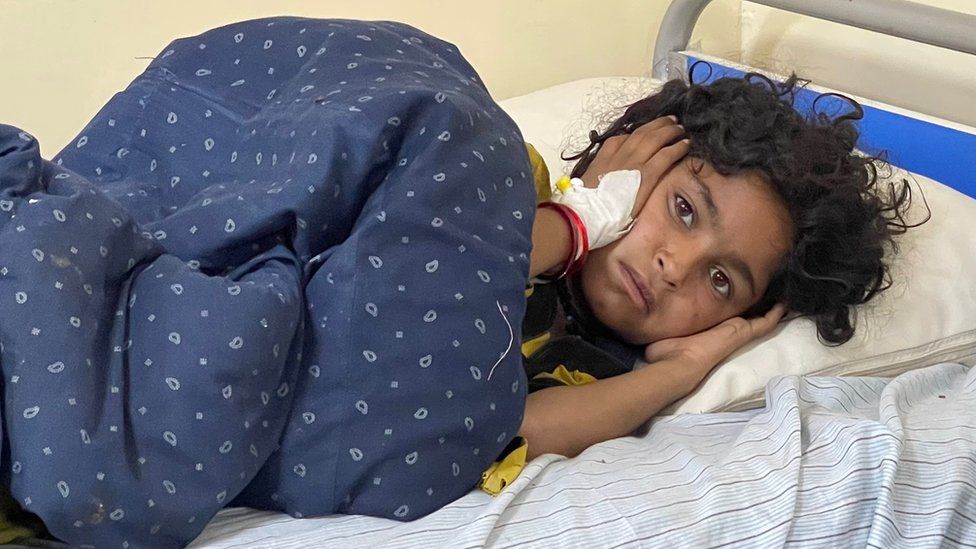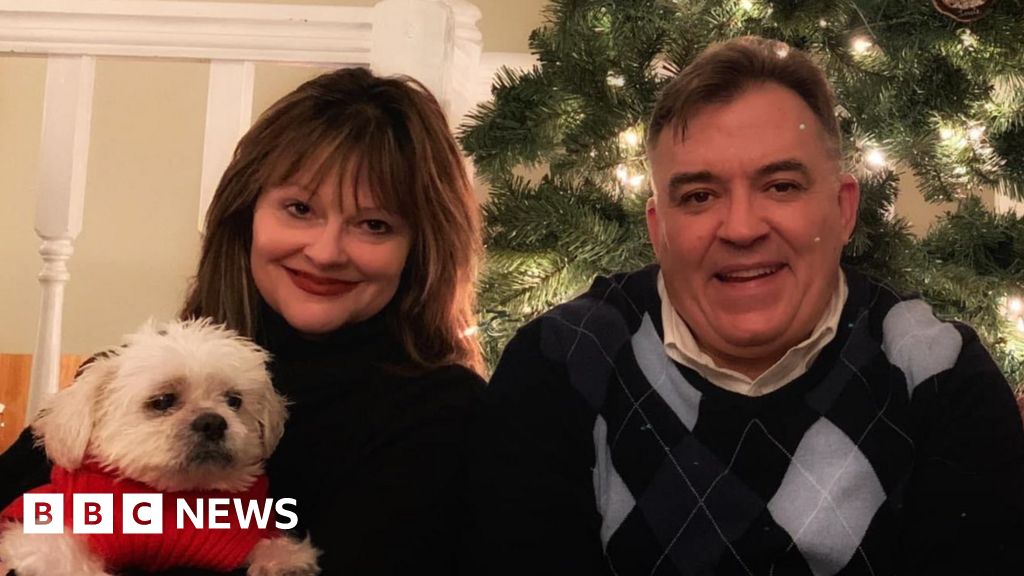ARTICLE AD BOX
By Yogita Limaye
BBC News, Paktika province, Afghanistan

Shakrina was severely injured in the quake
Eight-year-old Shakrina's face contorts in pain and she cries as she tries to turn on her side. She has multiple fractures on her body and her left leg is bandaged from the knee down.
From the hospital bed next to her, her mother Mira extends her arm, trying to comfort her.
Mira's right eye is heavily bruised, and she has a number of other injuries.
The two were pulled out from under the debris of their home in the Gayan district of Afghanistan's Paktika province, six hours after an earthquake destroyed it.
"I couldn't see my other daughter anywhere, so I asked those who rescued me where she was. That's when they told me she had died," Mira said, wiping her tears with her headscarf.
She found her teenage daughter Gulnoora among the bodies laid out in a row by rescuers in Gayan.
"Normally we'd sleep outside our homes, but that night there was rain and lightning, so we'd slept inside," she said.
Now recovering at Paktika's main provincial hospital, Mira is in a ward where almost everyone has a similar story.
Bibi Hawa is there with her 11-month-old daughter Safia. Both have multiple fractures. They've lost 18 members of their family in Wednesday's quake, which killed over 1,000 people.
The Sharana hospital is ill-equipped to deal with earthquake victims
Bibi Hawa's other children, her three sons Farooq, Hamza and Maqsadullah, were among those who died.
"My heart is in pain. Now when I go home there will be no-one there," she said.
On the day after the earthquake, she was among 75 injured people brought to the provincial hospital in Sharana, the capital of Paktika province. The facility has 72 beds, and it already had patients suffering from other illnesses.
It's not equipped to treat people with spinal injuries, or those who require neurosurgery. So the more serious cases had to be referred to other facilities.
Patients who had already travelled hours from remote areas to get to the hospital had to make another long journey on bumpy, untarred roads to get treatment.
Before the Taliban's takeover of Afghanistan, public healthcare was almost entirely funded by foreign money. The aid was frozen on 15 August last year, sending hospitals and medical facilities into near collapse.
In the aftermath of the earthquake, the Taliban have appealed to the international community for support. I asked their public health minister Dr Qalandar Ebad if they'd got any.
"Yes, we have received aid from countries in the region like Iran, Pakistan, India, Qatar, the UAE, and some Arab countries also. Europe has promised support, and we saw that the US president also made a statement. We are waiting for countries around the world to see how exactly they can help us," he said.
Qalandar Ebad insists the Taliban have fulfilled their international obligations
The Taliban government is not recognised internationally. The group also have sanctions against them.
I asked Dr Ebad if the Taliban had done enough to convince the world to recognise their government. "Yes, we have fulfilled all the parameters for international recognition. And most importantly all the people of Afghanistan support us."
The Taliban are not an elected government. And without them delivering on their commitments on women's rights and human rights, how does the group expect the world to recognise them, I asked.
Dr Ebad defended his government: "There is some misunderstanding among the international community. We have done more for women than any other government."
He said women were safer under the Taliban government, and that they planned to ensure all girls get an education. Their actions belie those claims.
The Taliban are accused of detaining and beating female protesters demanding women's rights. They've barred girls from secondary schools, and women from work, except in the public health and security sector. Recently they've also announced rules regarding what women should wear in public places.
WATCH: Body removed from rubble after deadly earthquake hits Afghanistan
But many point to Western accountability as well. Foreign funds contributed to three-quarters of state spending in Afghanistan and without it, the country has spiralled into an economic crisis.
Millions of ordinary Afghans have been caught in the politics of aid.
Mira and Bibi Hawa are among those who have been pushed into poverty. Another is labourer Shindigul Zadran.
On most days before the earthquake he couldn't find work. Injured in the disaster, he's had a steel rod inserted in his right leg which means that, at least for a while, he has no way to earn a living. And he's lost his house.
"My whole family worked so hard all our lives to build our house. Now it's gone," he said. "We will never be able to rebuild it without help."

 2 years ago
87
2 years ago
87








 English (US) ·
English (US) ·